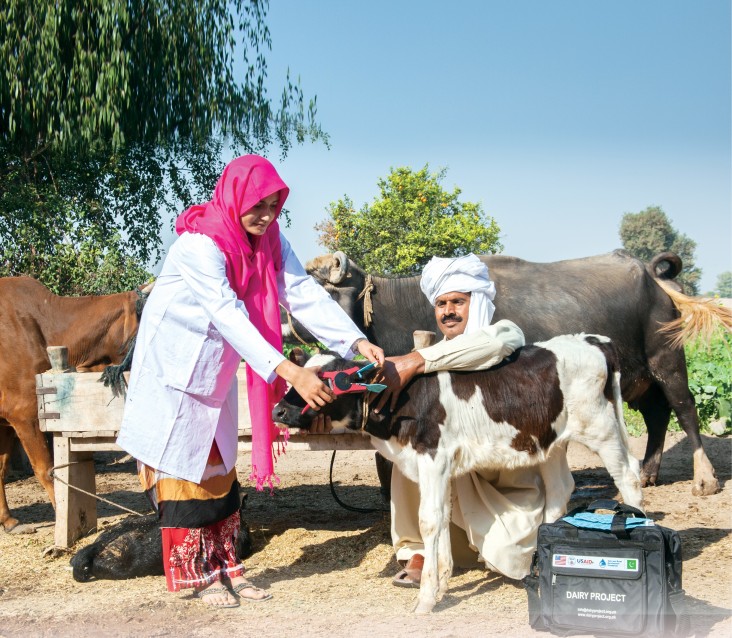
Improving Access to Economic Opportunities
USAID’s Dairy Project seeks to increase incomes and job opportunities for rural women by training them to work with livestock and supporting self-employment. Rural women earn extra income by providing extension services to fellow small dairy farmers. In mid-July 2015, the Satpara Development Project established dairy/livestock Farmer Field Schools for women to help improve the milk production from their cows and buffaloes. The Balochistan Agriculture Project helps female micro-entrepreneurs increase their income from wool through washing, mechanical shearing, and grading, as well as through market linkages. In a partnership with the U.S. Department of Commerce, USAID organized a Pakistan-Afghanistan Business Opportunities Conference that resulted in seats for women on the Pakistan-Afghan Joint Chamber of Commerce and Industry. The U.S.-Pakistan Partnership for Agricultural Market Development (AMD) is expanding the roles of women entrepreneurs in targeted product lines: mangoes, citrus, livestock, and high-value vegetables. AMD will provide grants directly to female agribusiness entrepreneurs as well as incentives to grantees who employ more female managers and workers. The upcoming Small and Medium Enterprise Activity will support female entrepreneurs by increasing their access to technology, markets, and finance; addressing inequities in policies related to registration, regulation, access to finance, and entrepreneurship; and strengthening women’s chambers of commerce and business associations.
Supporting Maternal and Child Health
USAID’s Maternal and Child Health (MCH) program is increasing access to and use of high quality maternal, newborn, and child health services. It is also increasing couples’ use of family planning methods with an emphasis on joint decision-making for healthy timing and spacing of births. USAID has convened women support groups to create safe places for women to meet, receive health information, and discuss health behaviors. Through MCH, USAID is also developing a Gender and Community Dialogue Toolkit for community facilitators to foster attitudinal change on key issues relating to women and girls’ health, education, and inclusion. Maturing into its third year, the MCH program is strengthening systems to ensure sustainable health gains in Pakistan’s newly decentralized health sector.
Supporting Women in the Energy Sector
USAID launched the second phase of its Energy Sector Internship Program in April 2015 for university graduates (including female graduates), placing them in public and private sector organizations that offered on-the-job experience and opportunities for advancement in a traditionally male-dominated field. Female participation increased across all training under USAID’s Energy Policy Program. The Power Distribution Program (PDP) established a day care center in the Multan Electric Power Company so women had a safe place to keep their children while on duty, and conducted gender equity training sessions for senior management. USAID also conducted briefings in all power distribution companies on the Sexual Harassment Act of Pakistan, addressing a key barrier to women’s participation in the sector.








Comment
Make a general inquiry or suggest an improvement.